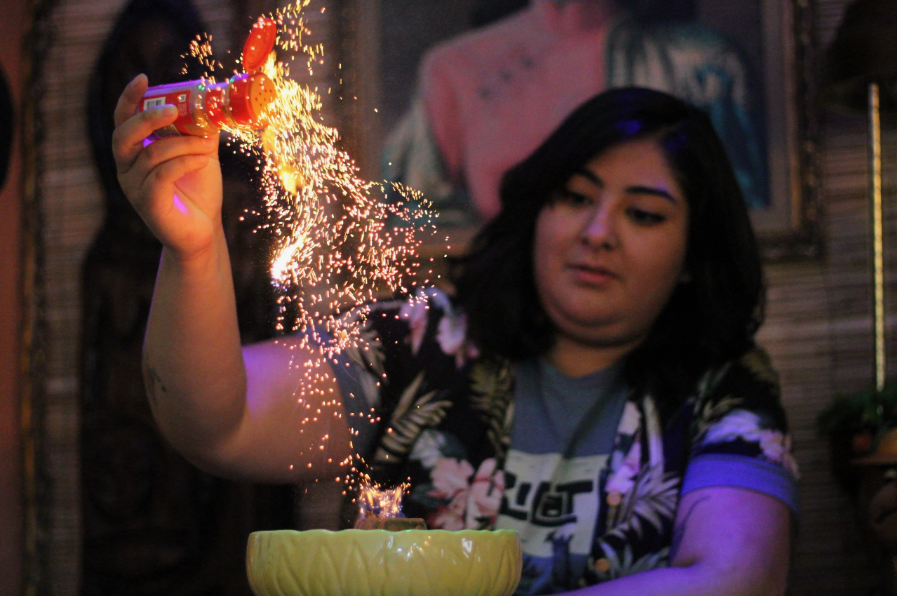She Is Still Woman

I was first exposed to the genius of Polly Jean Harvey through the gurus of the grunge generation, Beavis and Butt-head. More specifically, I became aware of her with the animated MTV duo’s commentary on her videos for “50 Ft. Queenie” and “Down by the Water.”
“Hey, it’s that Mallory chick,” Beavis (or was it Butt-head?) said of Harvey — whose red-framed sunglasses, patterned coat and dark, curly hair in the “Queenie” video indeed made her look much like Justine Bateman’s Family Ties character.
“This chick is weird,” Butt-head (or was it Beavis?) remarked as Harvey slunk around in a devilish red dress before drowning in the video for the sexy, scary “Water.”
Without a doubt, the impossibly skinny Brit was strange. But her odd mixture of seduction and death was darkly glamorous, and it had a fierceness that I — a frizzy-haired, bookish misfit still rocking the flannel shirts long after Ed Vedder had ditched the style — could only dream of possessing.
But Harvey has always made intensity sound easy.
In 1992 (Dry) and 1993 (Rid of Me), she channeled punk’s abrasive fury with sparse blues and gnarled folk. In 1995, To Bring You My Love (which featured “Water”) toned down those harsh edges but left the bristling attitude. The urban love notes of 2000’s Stories From the City, Stories From the Sea similarly pummeled with layers of glassy power chords. Even the murky electronica of 1998’s Is This Desire? sounded weighty and dignified, even if its sonic impact was more a chaste peck than a full-on lip lock.
Harvey revisits old tricks on her latest album, Uh Huh Her, with snarling fits of guitar scattered on the intricate “The Pocket Knife” and the scraping “Who the Fuck?” But Her finds its emotional center with subtlety on the wintry “The Slow Drug” and the dank, grungy “It’s You.”
But these days it doesn’t matter if Harvey is raw or polished, if she whispers or shouts, because more than ever her voice is muffled by the bell jar of conformity. As the opening act for U2’s most recent American tour, Harvey played to crowds who cared mostly about not spilling their $6 arena beer. And since that brief moment in the ’90s when MTV and radio opened their programming to female artists without perfect abs, she’s been relegated to specialty shows like 120 Minutes — if she is played at all.
Not that it should come as a surprise. Complex musicians who happen to be women are often too slippery for mainstream handling. Even the Yeah Yeah Yeahs’ Karen O — whose fierce strutting and preening owe much to Harvey — is a simplified caricature. For all of her beer-spitting wackiness, Ms. “Maps”-maker is little more than a token female Brooklyn hipster with willful artsiness and shtick.
For a brief moment in the ’90s, Harvey transcended her own volcanic persona. She was a fiery femme venting, and her brutal honesty formed indelible emotional bonds between her and her fans — even those who were introduced to her through Beavis & Butt-head.
I still remember the formidable cassette that my best friend dubbed for me of Harvey’s To Bring You My Love and Tori Amos’ Boys for Pele. I recall how “Big Exit” stunned me into teary silence when it reverberated from my editor’s office while I was interning at a magazine in college, the song’s ringing chords and powerful words (Baby, baby/Ain’t it true/That I’m immortal/When I’m with you) searing themselves into my mind.
These memories remain vivid not because Harvey and I share a gender but because they affected me personally, the same way male-fronted bands such as R.E.M. and the Smiths also did then and the way songs by Death Cab for Cutie and Idlewild do today. Passion is passion, regardless of chromosomal blueprint.
Still, it’s a mistake to think that Harvey’s gender is irrelevant to her music. Not because she’s a “chick who rawks!” but because of the impact her brazen femininity has on all of her listeners. Back when even the dynamic dumbasses noticed her, Harvey made it OK to be weird, OK to be gawky and introspective and confident and confused and angry and beautiful, just like every adolescent wracked with insecurity. She made it OK to verbalize the desire to castrate that jackass who screwed you over, to want to sing from the rooftops about your significant other, to celebrate other strong females.
Take a song like “C’Mon Billy” (from To Bring You My Love). Backed by sparse guitar and strings, Harvey’s voice cracks with vulnerability as she beckons a lover back (Come to me/You know I’m waiting/I love you endlessly), albeit with a twist — Billy Boy appears to have abandoned the child the two had together. Her aching for him, mingled with thinly veiled anger at his actions, is a nearly universal love-hate reaction.
But this paradox creates a sense of longing without resorting to self-pity. In a time when most pop stars seem like vapid conduits of desire and emo superheroes imbibe liberal doses of whine with their cheese, Harvey’s refusal to remain a passive spectator to her songs is a welcome anomaly.
On Her‘s “The Letter,” for example, distorted, grimy blues riffs wrap around Harvey’s calculated seduction by pen (It turns me on/To imagine/Your blue eyes/On my words). Then there’s the scolding received by the focus of “The Life and Death of Mr. Badmouth” (Badmouth, sad mouth, you were an unhappy child/That doesn’t make your lying tongue all right).
Indeed, her honest portrayals of strength and weakness remain flush with empowerment, not drained of adequacy. But by allowing her imperfections to complement her strengths rather than overshadow or become subordinate to them, Harvey’s humanity becomes frightening and all too raw. Which is what I miss most about her presence in the mainstream: the way she challenged fear with tenacity, giving her unpolished awkwardness a measure of grace.




